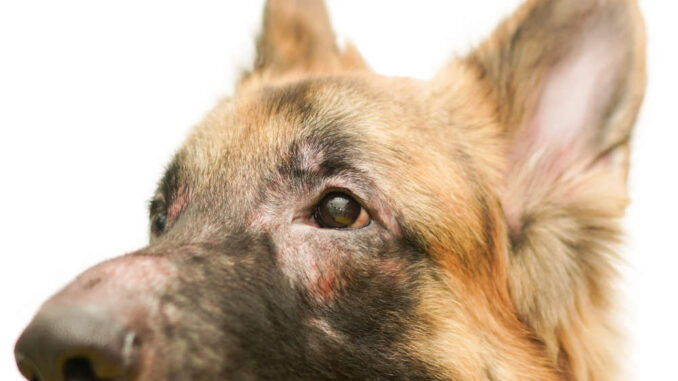
This article was updated on September 8th, 2023
The saying goes, “eyes are the windows to the soul” and our dogs certainly know how to use their “puppy dog eyes” to get us to give in to their demands for love and attention. But their eyes are also an indication of their general health, and changes to the eyes and the hair around their eyes can give us many clues to their health. This article discusses the main causes of hair loss around the eyes and provides general advice as to what you could do to help. A vet visit is always advisable if you notice any change in your dog’s health or behavior.
Is hair loss around the eyes in dogs a serious issue?
This really depends on the underlying cause of the hair loss. In many cases, simple home treatment may resolve the issue but there are other causes that can be severe and necessitate prompt veterinary treatment. If you notice any changes to your dog’s eye itself or in their behavior and if they are showing distress, an urgent vet visit is advised.
Top reasons behind hair loss around a dog’s eyes
1. Allergic Reactions:
Allergic reactions are relatively common in dogs and can result in hair loss around the eyes.
Appearance: If your dog’s hair loss is accompanied by other signs of allergies, such as itching or skin irritation, it may be due to an allergic reaction. Hair loss around the eyes due to allergic reactions is often accompanied by redness, itchiness, and swelling. In some cases it may happen very suddenly and be accompanied by hives all over the body if the allergic reaction is due to something like a bee-sting.
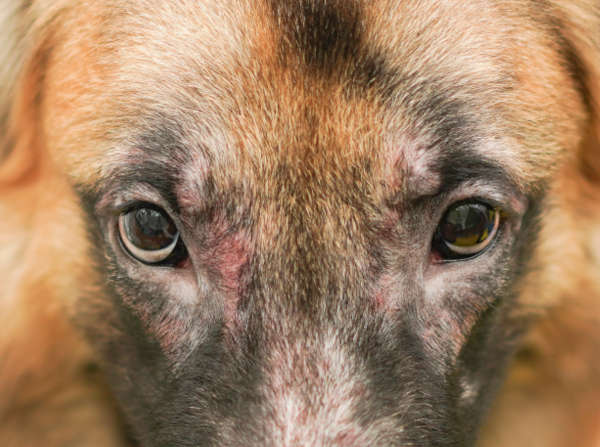
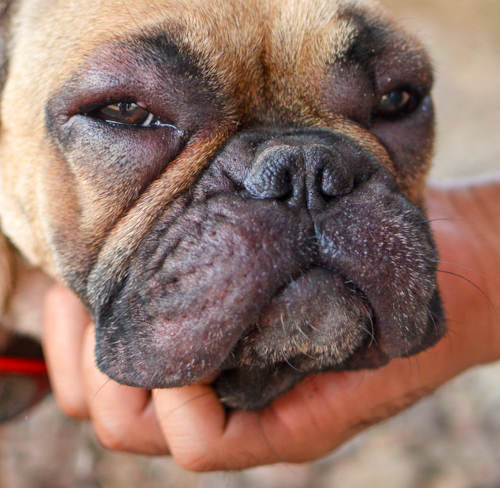
Dogs with chronic allergies may be itchy in other areas in the body and may lick and bite at their skin excessively (read our article about itchy dogs losing hair). They may have redness and swelling of the conjunctiva (the inner eyelids).
Home remedies for hair loss around the eyes due to allergies: Clean around the eyes using lukewarm water with no soap or shampoo. If the itching or swelling is severe, then a vet visit is indicated.
Veterinary Treatment: If the hair loss persists or worsens or if they are generally very uncomfortable and itchy, it is advisable to consult a veterinarian for proper diagnosis and treatment. They may recommend antihistamines, corticosteroids, or other medications to manage the allergies. If they have discharge from the eyes, especially yellowish or greenish discharge or if they are holding their eye closed, then an urgent vet visit is advised.
2. Dermatitis
If the hair loss around your dog’s eyes is accompanied by signs of skin irritation or itching, dermatitis may be the cause. Dermatitis is inflammation of the skin and can be caused by allergies, mites, or infections (including fungal infections). Symptoms include redness, swelling, discomfort, and hair loss around the eyes. The skin may appear dry, flaky, or crusty.

Home remedies for hair loss due to dermatitis: Owners can gently clean the affected area with a lukewarm water and keep the dog’s environment clean and free from potential irritants. However, it is important to consult a vet for proper diagnosis and to address the underlying cause of the dermatitis.
Veterinary Treatment: A veterinarian can diagnose the specific type of dermatitis and recommend appropriate treatment, which may include topical medications, oral medications, or changes in the dog’s diet.
3. Conjunctivitis
Conjunctivitis, also known as pink eye, can cause hair loss around the eyes due to excessive rubbing or scratching. If the hair loss is accompanied by redness, swelling, discharge, or excessive tearing, conjunctivitis could be the cause. The inner eyelids may appear red, swollen, and produce discharge.
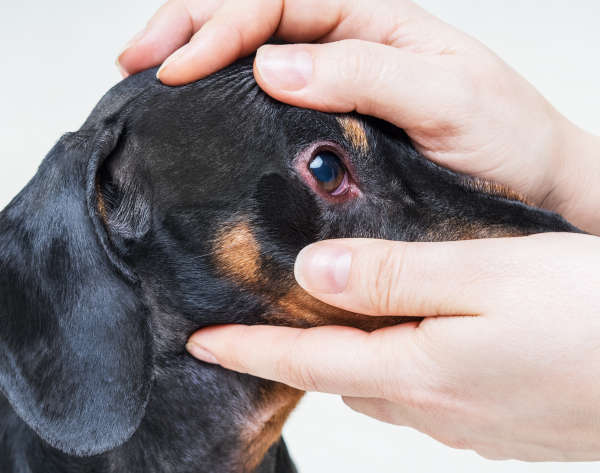
The dog’s eye will be painful, and they will often hold them semi-closed and may scratch and rub the eye. They will often become head shy and will not allow their owners to touch their head.
Conjunctivitis is relatively common in dogs and can range from mild to severe, depending on the underlying cause. In some cases, the conjunctivitis is secondary to an ulcer on the cornea or irritants in the eyes. Dogs also suffer from dry eye (keratoconjunctivitis sicca) which can cause chronic conjunctivitis and hair loss.
Home remedies for hair loss due to conjunctivitis: Owners can gently clean the eyes with a dilute saline solution and apply a warm compress to soothe the irritation. However, it is crucial to have the condition evaluated by a veterinarian to determine the cause and appropriate treatment.
Do not use any eye drops that you may have at home, without consulting a veterinarian first. Some eye drops are contraindicated depending on what the underlying cause may be. This means that they might worsen the eye condition, especially corneal ulcers.
Veterinary treatment: a veterinarian will examine the eyes, determine the underlying cause, and prescribe specific eye drops, ointments, or oral medications to treat the conjunctivitis. If they have a chronic underlying condition, like dry eye, the vet will prescribe eye drops that can be used long term to prevent further complications.
4. Glaucoma
Glaucoma, a condition characterized by increased pressure within the eye, can lead to hair loss around the eyes due to rubbing or scratching. The affected eye may appear red, swollen, and the dog may experience vision problems. Glaucoma tends to cause severe pain and your dog may be very head shy.
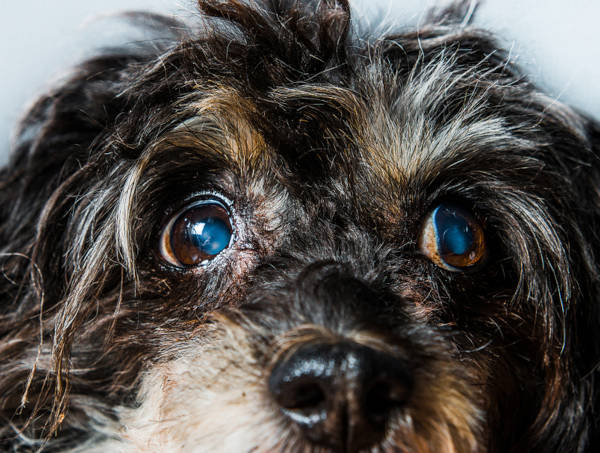
Glaucoma is a serious condition that requires immediate veterinary attention. While not as common as other causes of hair loss around the eyes, it can have severe consequences if left untreated. Glaucoma can lead to blindness and if not treated quickly may cause such severe pain that the eye may need to be removed.
An urgent vet visit is required to perform a thorough eye examination, including measuring intraocular pressure, to diagnose glaucoma. Treatment may include medications to reduce intraocular pressure, surgical interventions, or a combination of both. Prompt veterinary treatment is necessary to preserve vision and prevent further complications.
5. Autoimmune conditions
Several autoimmune conditions, including a variety of pemphigus and lupus like conditions may cause hair loss around the eyes. You may also notice loss of pigmentation of the skin and hair (it turns white or becomes lighter) and crusting and sores around the eyes, lips, and nose. Autoimmune conditions occur when the body’s immune system starts attacking normal cells in the body.
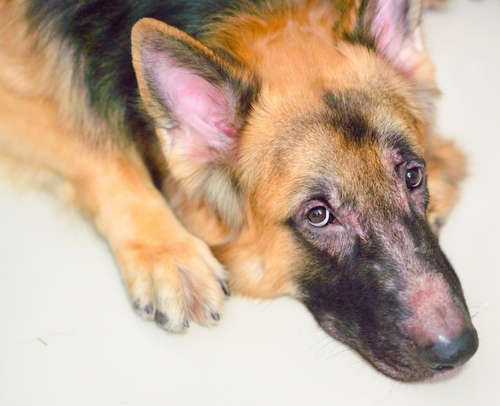
If you notice hair loss and changes in pigmentation as well as similar sores and redness or crusting where the nose meets the haired skin and on the lips then autoimmune conditions may be the cause.
Fortunately, autoimmune conditions are not common. There are a many different autoimmune conditions and their severity depends on the underlying cause. Regardless of the cause, they will require treatment and in some cases this will be lifelong. Some autoimmune diseases are systemic (they affect more than one body system), and these can be quite severe and life-threatening.
A vet visit is essential to rule out other causes and determine the exact cause of the autoimmune condition. The vet will need to biopsy the affected area. This will require sedation or general anaesthetic and the vet will take a small sample of affected skin and send it to the lab to get an exact diagnosis. The vet will then prescribe the correct treatment for the dog’s autoimmune condition. Follow up visits will be required to ensure response to treatment and to ensure that no side effects of the medication are experienced.
6. Parasites
Mange mites (e.g. Demodex and Sarcoptes) and ear mites (Otodectes) may cause hair loss around your dog’s eyes, especially if they are very young, very old, or immunocompromised. Flea infestations may also cause excessive scratching and rubbing of the head causing hair loss.
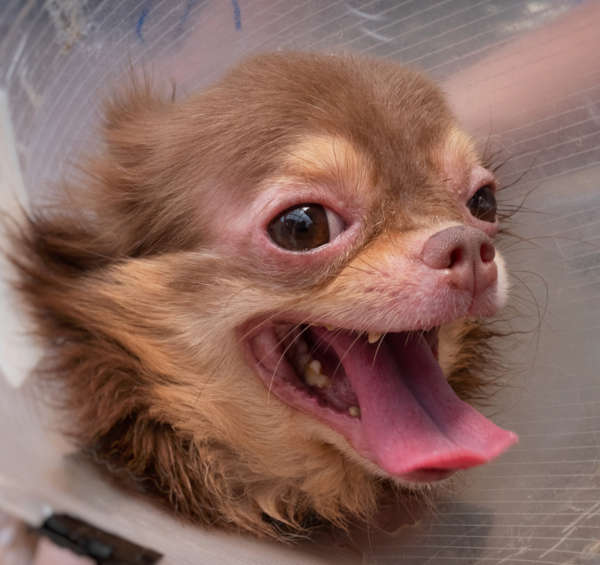
Hair loss around the eyes accompanied by excessive scratching and head rubbing may be causes by parasitic infections.
If your dog is not given preventative treatment against fleas and mites they may be at risk of contracting a parasitic infestation. These infections tend to be more prevalent in younger, older animals or animals with a compromised immune system. Fortunately, parasitic infections are relatively easily treated, although they are often due require veterinary assessment and treatment.
Home remedies for hair loss around the eyes as a result of parasites: If you suspect a parasitic infection and your dog is otherwise happy and appears to be healthy, then using an over the counter anti-parasitic may help. In severe cases, a veterinary assessment may be required.
Veterinary treatment: A vet will be able to diagnose the exact parasite causing the problem by examining a skin sample under the microscope. This sample can be taken without sedating your pet. They will then be able to recommend the appropriate antiparasitic treatment and the correct dosing interval.
Assessing the Severity and Extent of Hair Loss Around the Eyes
When you notice hair loss around your dog’s eyes, it is essential to assess the severity and extent of the hair loss. Look for accompanying signs such as redness, swelling, itching, discharge, or changes in eye appearance. If the hair loss is mild and there are no other concerning symptoms, it may be appropriate to try some home remedies initially. However, if the hair loss is severe, worsening, or accompanied by other concerning signs, it is advisable to seek veterinary attention promptly.
Would a Vet Be Able to Help Over a Video Call?
Yes, in many cases, a veterinarian can provide assistance and guidance through a video call. A video call can be very helpful to assess the severity of the issue and for the vet to guide you on potential home treatment. The vet will be able to guide you on what red flags to look out for and what criteria would need to be vet to assess if a vet visit is required.
Whilst a video call can be a convenient and cost-effective option, especially if you have a subscription service for vet video calls there are some limitations. Depending on how your dog is doing and what the suspected diagnosis may be an in-person vet visit may still be required.
Ultimately, the decision to opt for a video call or an in-person veterinary visit depends on the severity of the condition, the availability of veterinary services, and the recommendations of your veterinarian.
Frequently Asked Questions:
How can I differentiate between normal tearing and excessive tearing causing hair loss?
All dogs produce tears. Tear production may be more obvious in white coloured dogs as the tears tend to stain the hair around the eyes a brownish color. Excessive tearing causing hair loss is often accompanied by other signs such as redness, swelling, discharge, or changes in eye appearance. If you notice these additional signs or if the tearing seems excessive and persistent, it is advisable to consult a veterinarian for further evaluation.
Can I prevent more hair loss around my dog’s eyes?
Prevention strategies for hair loss around the eyes include regular grooming, keeping the area clean, and addressing any underlying allergies or skin conditions. Avoiding potential irritants or allergens and providing a balanced diet can also contribute to overall skin health. However, it is important to note that some underlying causes may not be entirely preventable, and prompt veterinary attention is necessary if hair loss occurs.
Related posts:
Disclaimer: This website's content is not a substitute for veterinary care. Always consult with your veterinarian for healthcare decisions. Read More.



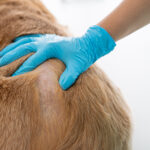
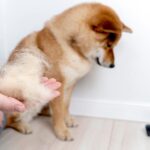
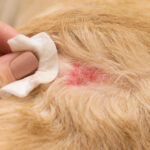
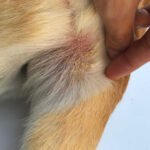
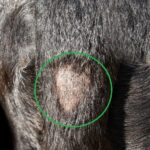


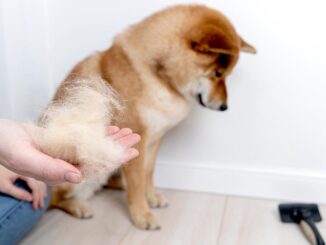
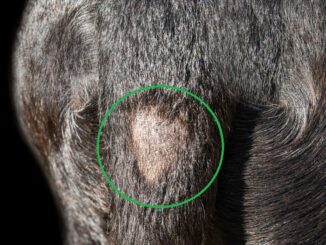
Be the first to comment